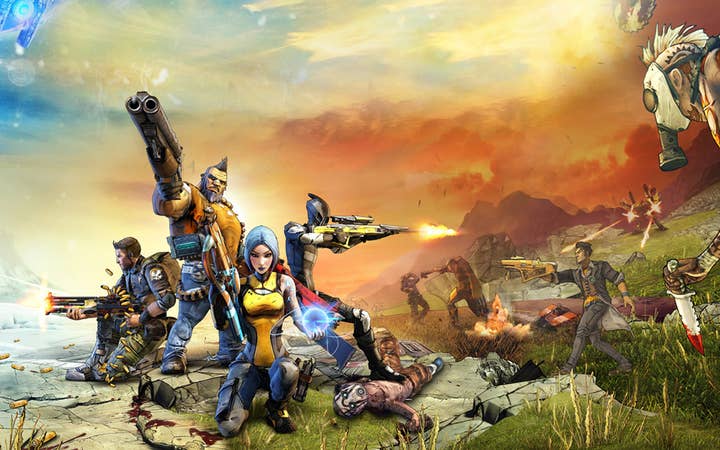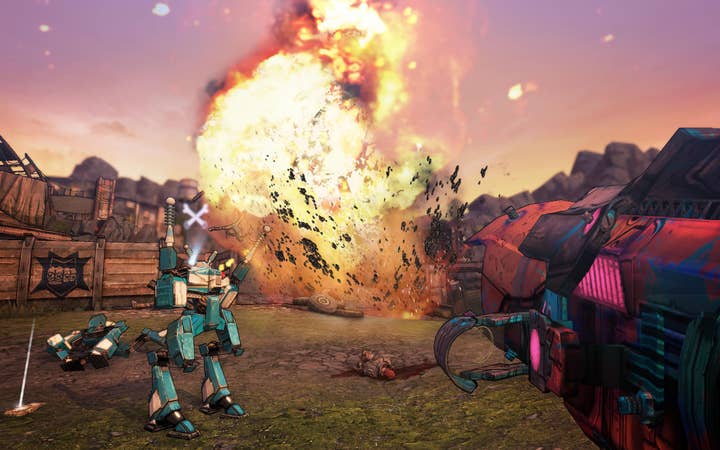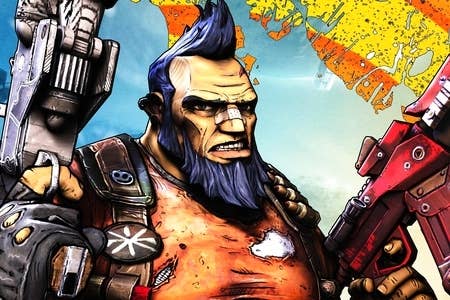Critical Consensus: Borderlands 2
Can Gearbox hit the high notes of its surprise success again?
Sometimes, one decision can change a game forever. For much of its early development, Gearbox's 2009 original Borderlands looked for all the world like just another FPS: bland characters in what appeared to be a grey/brown post-apocalyptic wasteland, hosing bandits with mundane munitions. It was only when updated "concept" shots of a new art style were released that Borderlands really took its spot in the public consciousness.
Here was something a little more fresh, with touches of Timesplitters or XIII - something to break the tedium. As more details were eked out, displaying the emerging humour, co-op focus and mind-blowing procedurally-generated arsenal, the vision took shape. This felt like something of an experiment, and a pretty one at that.
Over 4.5 million copies and four pieces of excellent DLC later, that experiment can certainly be said to have paid off, and Borderlands as a franchise has moved from a quirky new IP to a title with the weight of expectation on its shoulders.
"We have believed for several months now that tomorrow's release of Borderlands 2 could be a significant and underappreciated catalyst for Outperform-rated TTWO shares."
Doug Creutz, Cowen.
Luckily, adding five or ten points to an already high Metacritic rating is most definitely considered a success for a sequel, and with Borderlands 2 hovering around the 90 mark compared to the original's 84, Gearbox should be anticipating a healthy pay-day - especially given the canny tactic of pre-empting the blockbuster season by a few weeks, something which has been working excellently for Sleeping Dogs recently.
Analysts agree, with Doug Creutz at Cowen putting a "conservative estimate" of 5 million sales for Borderlands 2 on consoles in the first year alone, and accurately predicting a 90+ Metacritic rating - figures based on high pre-order numbers and early reviews from IGN, Gamesmaster and Game Informer.
The critics, perhaps a little hungry for pithy aphorisms after a summer of relative drought, have clearly enjoyed their time with the game, offering ratings ranging from full-marks from the Guardian and G4TV to 75 per cent as the bottom margin from newcomers Polygon.

Christian Donlan at Eurogamer produces 2000 words of typically lucid assessment leading to a score of 9/10, describing it along the way as "A hillbilly moonshiner sort of game, then, but it's the hillbilly at his canny, tinkering, big-dreaming best," a description which encapsulates perfectly the game's combination of home-brewed aesthetic with a slick, fluid design core.
Fears of the game being little more than a '1.5' rather than a true sequel are quickly allayed, too, with Donlan asserting that "Questing, levelling, shooting, even driving: almost everything important has been improved while each little detail has been refined." Because of this, quests are tighter, NPCs more memorable, firefights more explosive, player characters "quirkier and more boldly realised than the original game's heroes", and the all-important guns more distinctive.
Those weapons, Donlan believes, are "at the heart of Borderlands", providing much of the motivation and excitement. They do, however, also provide the only real point for pause - with their universally 'lootable' nature meaning that you'll need to choose your co-op partners carefully if you want to see them shared equally.
But whilst Borderlands has adopted many of the welcome trappings of a AAA success, Donlan is happy to see that it retains enough of that experimental roguishness which won the original so many fans.
"Borderlands has lost none of its untidy charm in the transition from unlikely hit to megabucks tent-pole."
Christian Donlan, Eurogamer
"There are plenty of improvements, then, but the most satisfying thing to note is that Borderlands has lost none of its untidy charm in the transition from unlikely hit to megabucks tent-pole. The storyline runs a touch deeper now, but it's largely resisted the lunge towards the blandly epic - and while the art sparkles, it's ducked the big-team slickness that can rub away at a game's personality."
"Compared to the dull, empty-eyed stoicism of so many triple-A games, it's still a welcome blast of idiot humour."
That healthy dose of low-brow fun is also celebrated in Anthony Gallegos' review for IGN, which also culminates in a 9/10. Early on, Gallegos is quick to point out that this is not a game about tactics or fine-tuned strategy, but about bright explosions and itchy trigger fingers.
"No matter the quest, at some point something or someone is getting pounded with lead. Thankfully, snappy shooting and lots of environmental hazards combine with each class's unique ability to turn every skirmish into a playground,"
"You simply have to decide the best - or most entertaining - way to kill everyone."
For IGN, guns are again almost as much the central characters as the player roles themselves, with loot providing the evolution and reward structure which adds endless colour to the hail of bullets, which always "keeps things from dragging, and drives you rapidly onward in the never-ending quest for loot."
Nonetheless, Gallegos is also pleased with the newly refined classes, particularly the expanded skill trees, which can be re-specced from the hub town for nominal amounts of cash. Because these options are so much broader, playing online with others who share your class no longer means that you'll find yourself surplus to requirements.
As Gallegos points out, "On the surface two people's takes on a class might seem similar, but the new, more filled out skill trees allow you to create a version of a class that better suits your style."

Again, loot-sharing is seen as a problem, but only one which means that parties must be carefully constructed, because "Playing with strangers or super aggressive friends means you'll likely find yourself in a race to see who can grab everything the fastest, and that's really not all that fun."
Edge takes a more clinical approach to its dissection of the game's mechanics, praising the newly diverse level layouts, combining vast open spaces where vehicles are king with the choke points, room-to-room combat and forced intimacy of interior conflicts - alongside an appreciation of the quandaries raised by the plethora of firearm options available.
Like a number of other commentators, Edge's nameless reviewer also draws happy comparisons to one of Blizzard's best-loved IPs: Diablo, as well as the hectic destruction of Robotron: 2084.
"Borderlands is like Robotron: 2084 - it's about juggling threats, and about movement and precise shooting, whether at long range or short. Borderlands is most certainly not about using static cover to make slow, inexorable progress across its stages. And, yes, it's also like Diablo in terms of progressing your character through skill trees and gathering sackfuls of shiny loot."
"Given the glorious sense of flow to most of the game, it's a pity that bosses present spikes in the difficulty level."
Edge
Earning itself another 9 in the process, it's clear that Gearbox has impressed Edge with the granularity of the character customisation, which includes a huge array of micro-tracked sub-achievements which offer smaller performance bonuses to all of your characters, not just the current save, although, as pointed out, "you can switch it off for a more purist approach."
Other noteworthy features for the Future flagship are "weapon drops that seem to offer more variety and power than in the first game, and thrilling multi-faction battles," which see the game's disparate biospheres clashing together, allowing you to have scuttling Skags, bounding Bullymongs and the screeching Rakk do the dirty work on unsuspecting bandits or Hyperion robots, should you so wish.
Polygon's 75 per cent is currently the lowest score on the Metacritic leaderboard, and there are predictably disparaging remarks on its comment thread as a result, accusing the new outfit of shooting low as "a gimmick to get more traffic" - something often levelled at reviewers who step out of Metacritic's often fairly homogenised line.
Given Arthur Gies' experience, and position as reviews editor, it's clearly churlish to accuse him of hit-baiting, and he details his gripes with 2K's latest eloquently in his text, calling into question the efficacy of the stylistic and genre melange which other reviewers have clearly enjoyed, opining that the improved coherency over the original is not enough.
"Taken only by its design," Gies says of the original, "it's a collection of parts from multiple genres - the quests of an MMO, loot influenced more by action RPGs like Diablo, and shooting out of, well, a shooter. None of these parts were exemplary, and they were even combined in what could be affectionately labelled a haphazard way."
"A clearer vision from the start doesn't prevent Borderlands 2 from straining in several design directions at once."
Arthur Gies, Polygon
The sequel, is better, says Gies, is a better attempt at coherence, but falls short.
"The story is developed and surprisingly thoughtful, and systems link together more. The result is a better game in almost every regard and, interestingly enough, a more ambitious one. However, a clearer vision from the start doesn't prevent Borderlands 2 from straining in several design directions at once."
Although hailing the improved engagement offered by a more structured storyline and well-defined villain in the shape of Handsome Jack, Gies is disappointed by a "yo-yo mission structure" which sees players running from one point to the next on basic kill or fetch quests too often, which "feels like MMORPG quest design of the worst kind, designed to pad length and keep butts in seats."
Polygon is the only outlet which makes a direct point of the handholding displayed by Borderlands 2, expressing concern over a level of auto-aiming which means that "hitting things isn't a problem - it's just not very exciting."
For Gies, the combination of frantic co-op and well-written script is not quite enough to overcome the points of mediocrity and repetition, meaning that, for him, "playing Borderlands 2 doesn't feel markedly different from the first game."
"It creaks somewhat under the pressure of needing to be more without the lightning-in-a-bottle newness that propped Borderlands up. The shooting still lags behind other first-person frontrunners, and combat too often feels like an afterthought in Borderlands 2's enormous world. It's often mired in the design problems of the genres it borrows from."
Gies' points make an interesting distinction. He's seemingly less dazzled by Borderlands 2's carnival atmosphere and rugged charm, and doesn't quite find enough joy in the crucibles of its firefights to overcome the lack of diversity in the tasks it demands of its players.
Perhaps not one for the hardcore purists, then, but find three friends who don't mind a cheerful excuse to blow things up in interesting ways and you've got yourself 30-40 hours of trigger-exhausting enjoyment.

